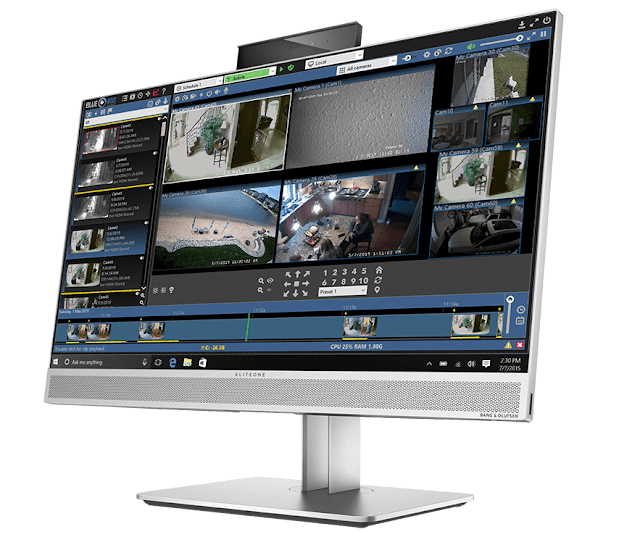What is Network Video Recorder (NVR) ? : A Comprehensive Guide, Specifications, and Analysis
NVR stands for Network Video Recorder; it is a specialized system that records and stores videos coming from IP cameras in a Hard Disk Drive or on the cloud in a digital format. An NVR is typically an IP-based video surveillance system. NVR is different from DVR because they do not have any video encoded Hardware, the video of IP cameras is decoded and processed in themselves and then sent the video to NVR for storage and remote viewing.
In the case of a large number of cameras, NVR is the best choice for video surveillance. NVR is flexible in nature. Due to its flexibility, making them suitable for larger and more complex surveillance setups. NVR is suitable for small-scale setups such as small shops, homes as well as commercial and industrial facilities.
Non-PoE NVRs do not have the ability to provide Power over Ethernet cable. This NVR is less costly than PoE NVR but difficult to install because each camera needs a power source like an adapter and power cable.
In the case of a large number of cameras, NVR is the best choice for video surveillance. NVR is flexible in nature. Due to its flexibility, making them suitable for larger and more complex surveillance setups. NVR is suitable for small-scale setups such as small shops, homes as well as commercial and industrial facilities.
Types of NVR:
There are two types of NVR available:
- PoE NVR
- Non-PoE NVR
- WI-FI NVR
- PC NVR
PoE NVR:
PoE stands for Power over Ethernet, NVR equipped with PoE features can provide data and power over a single Ethernet cable. PoE NVRs have a dedicated port for every camera which can provide power along with data transmission.
Due to PoE features it simplifies the installation process because there is no need for separate power cables and power adapter for each camera. PoE NVR's installation is very easy fast and cost-effective.
Drawbacks of PoE NVR:
PoE NVR or PoE switches are more expensive compared to Non-PoE NVR with separate power supply.
Every port of NVR has a limited transmission distance. It can be from 100 meters to 120 meters.
Non-PoE NVR:
 |
| Hikvision Non-PoE NVR, It has just one Ethernet Port. |
These NVRs need an extra switch for connection with the internet because non-PoE NVRs generally have one Ethernet port.
Maintenance of Non-PoE NVR is also very difficult because outside cameras are always exposed to sun and rain, and due to this power adapter of the cameras dies frequently.
Maintenance of Non-PoE NVR is also very difficult because outside cameras are always exposed to sun and rain, and due to this power adapter of the cameras dies frequently.
Drawbacks of non-PoE NVR:
Cable complexity is one of the drawbacks of non-PoE NVR because every camera needs a separate power supply.
Wireless NVR:
 |
| An Ezviz Wireless NVR |
A WI-FI Network Video Recorder is a specialized device designed to manage wireless IP cameras. These devices are equipped with wireless radios and support various Wi-Fi standards like 802.11ac or 802.11ax, Due to these features, allow them to communicate seamlessly with wireless cameras. Wireless NVR also have features like Remote access, Motion detection, and local storage with the help of a Hard Disk Drive.
Drawbacks of Wireless NVR:
They have some drawbacks like Limited bandwidth and range limitations.
List of top Wireless NVR Manufacturer companies:
1: Hikvision
2: Dahua
3: Ezviz
4: Lorex Technology
PC NVR:
 |
| Blue Irish Software Running on PC. Image Credit: Blue Iris |
A Personal Computer Network Video Recorder is a unique software-based solution that allows personal computers to work like a Network Video Recorder for video CCTV cameras.
It involves installing some special kind of software on a standard PC which allows recording and managing videos, playback, motion detection and remote access of camera feeds from IP cameras.
Blue Iris, Milestone XProtect, Avigilon Control Center and Synology Surveillance software are some examples which can turn a PC into a Network Video Recorder.
What is a Digital Video Recorder? Click on this link to read more.
Conclusion:
In conclusion, Network Video Recorders is a powerful device for capturing, storing and managing surveillance video footage.
NVRs are digital, compatible with IP cameras, and high scalability in nature supporting remote monitoring and playback. These capabilities make them very important components of modern surveillance systems.
NVRs are digital, compatible with IP cameras, and high scalability in nature supporting remote monitoring and playback. These capabilities make them very important components of modern surveillance systems.

1 comment